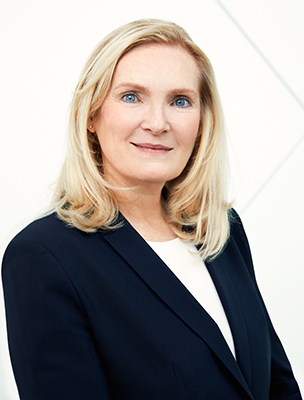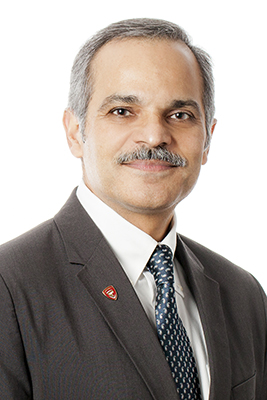
An image of the COVID-19 virus that was created by the Centers for Disease Control in the United States
York University has awarded $300,000 in research grants to advance 20 new research projects dedicated to Canada’s fight against COVID-19 and its impacts. The University recently announced a $250,000 research fund and call for proposals to support immediate term COVID-19 research projects. Due to the impressive response, the University increased the fund by $50,000 to support the further development of additional high-potential projects.
York researchers will undertake 10 new projects related to COVID-19 over the next year with special funding of more than $250,000 from the University. Researchers will study the human and public health impacts of the pandemic with a broad goal to find unique responses to the challenges of COVID-19.
The projects selected will address topics ranging from the impact of COVID-19 on child protection investigations, to how textiles and non-woven materials could be modified to boost protection offered by cloth-based personal protective equipment (PPE). York researchers will also examine transmission of the virus through microdroplets and potential implications for ventilation system design, as well as the role that variations in the genomic sequences of the virus play in infection and disease.
An additional 10 projects will receive a total of $50,000 in seed funding to develop their proposals further in order to attract external funding. In all, more than 150 projects were proposed.

Rhonda L. Lenton
“We have an exceptional community of researchers eager to examine the social and health impacts of this pandemic, and York is proud to provide funding to support this important work,” said Rhonda L. Lenton, president and vice-chancellor. “Our researchers are called to serve the public through exploration and discovery and together with our partners in industry, government and community organizations, we are embracing our role in aiding the world’s recovery from COVID-19.”

Amir Asif
Researchers were asked to submit their proposals in April to a panel of scholars that chose which projects should be funded, to start immediately.
“This was a competitive grant with a time-sensitive deadline, and I would like to thank all applicants and congratulate those chosen to receive funding.Their projects demonstrate York’s exceptional interdisciplinarity and the University’s ability to respond to the unique challenges posed by COVID-19 in these unprecedented times,” said Vice-President Research & Innovation (VPRI) Amir Asif.
Research funding for this important COVID-19 initiative was provided by three areas within the University: the Office of the President provided $100,000; the Office of the Provost and Vice-President Academic contributed $50,000; and the VPRI provided $100,000. Following the number and strength of submissions, the VPRI added $50,000 for seed funding, bringing the total funding to $300,000.
The 10 funded projects are listed below, divided into two categories, with the principal investigators who are leading the research, and funding amount.
Category A – Social Science, Humanities, Education, Arts & Business
Ingrid Veninger, Cinema and Media Arts, School of the Arts, Media, Performance & Design (AMPD), will work with 10 female filmmakers self-isolating in Australia, Spain, Canada, South Africa, Germany and the United States. The filmmakers will produce a 10-minute cinematic “chapter” in response to COVID-19, joining them together in a 100-minute film that is greater than the sum of its parts. ($15,000)
Daniel Kikulwe, School of Social Work, Faculty of Liberal Arts & Professional Studies (LA&PS), will lead a critical examination asking how Children’s Aid Societies across Ontario are adapting child protection investigation safety interventions, within the context of the COVID-19 pandemic, for immigrant and refugee families. ($16,570)
Jinyan Li and Scott Wilkie, Osgoode Hall Law School and Thaddeus Hwong, LA&PS, will evaluate Canadian government support programs, their short-term and permanent impact on the financial health of Canada and lessons from the COVID experience that will assist in developing a fiscal antibody for future emergency responses. ($14,792)
Sue Winton, Faculty of Education, will research how teachers in two school districts, in Alberta and Ontario, enacted online learning policies in response to the COVID-19 pandemic, and examine implications for social inequality. ($19,527)
Aaida Mamuji, Disaster & Emergency Management, School of Administrative Studies, LA&PS, will lead a study on the risks and benefits of contact tracing measures, and establish a foundation for developing guidance mechanisms when digital contact tracing methodologies are deemed a viable solution. ($36,833)
Gertrude Mianda, Gender, Feminist and Women’s Studies, Faculty of Graduate Studies and the Tubman Institute and Elaine Coburn, International Studies and the Centre for Feminist Research, Glendon, will co-lead a team examining how gender influences the challenges that measures such as social distancing, closure of schools and travel restrictions pose to African immigrant men and women, and how policies and practices could change. ($23,224)
Category B – Health, Science & Engineering
Jennifer Chen, Cora Young and Trevor VandenBoer, Chemistry, Faculty of Science, are researching how to modify textiles and non-woven materials to derive antimicrobial properties that will increase the protection of cloth-based personal protective equipment (PPE). Existing antimicrobial agents present health risks and environmental toxicity, so they will develop methods to incorporate copper for cloth-based PPE. ($44,000)
Marina Freire-Gormaly, Mechanical Engineering, Lassonde School of Engineering, will work with Faizul Mohee, director of research at TMBNEstradosinc, to explore how COVID-19 is transmitted by microdroplets that remain suspended in the air, and the implications for improved HVAC design. ($25,000)
A.M. Viens, Health Policy & Management/Global Health, Faculty of Health, Adèle Cassola, investigator, Global Strategy Lab, Roojin Habibi and Steven Hoffman, Osgoode Law School, Eric Kennedy, LA&PS, are leading an interdisciplinary team mapping and evaluating laws and policies, focusing particularly on emergency powers and restrictive public health measures. The project will catalogue and evaluate legal instruments in terms of law, human rights, and commitments under the Charter of Rights and Freedoms. Parallel projects are collecting similar data, which will enable researchers to compare the success of different government responses to COVID-19 in jurisdictions worldwide that have similar legal traditions. ($39,800)
Vivian Saridakis, Biology, Faculty of Science, Gillian E. Wu, Faculty of Health, are on a team to investigate the hypothesis that variations in the genomic sequences of the virus may play a pivotal role in geographic differences in rates of COVID-19 infection, transmission and deaths. Using bioinformatics and biochemical approaches, they will analyze the genomic variations and their resulting structural or functional changes, in order to establish the roles of these variations in COVID-19 infection and disease. ($20,000)
Courtesy of YFile.
